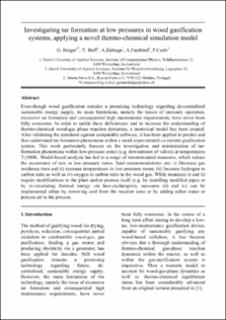Please use this identifier to cite or link to this item:
https://doi.org/10.21256/zhaw-19154Full metadata record
| DC Field | Value | Language |
|---|---|---|
| dc.contributor.author | Boiger, Gernot Kurt | - |
| dc.contributor.author | Buff, Vincent | - |
| dc.contributor.author | Zubiaga, Asier | - |
| dc.contributor.author | Fassbind, Adrian | - |
| dc.contributor.author | Caels, Pedro | - |
| dc.date.accessioned | 2020-01-23T13:57:15Z | - |
| dc.date.available | 2020-01-23T13:57:15Z | - |
| dc.date.issued | 2019-12-18 | - |
| dc.identifier.isbn | 978-3-9503671-1-9 | de_CH |
| dc.identifier.uri | https://digitalcollection.zhaw.ch/handle/11475/19154 | - |
| dc.description.abstract | Even-though wood gasification remains a promising technology regarding de-centralized sustainable energy supply, its main limitations, namely the issues of unsteady operation, excessive tar-formation and consequential high maintenance requirements, have never been fully overcome. In order to tackle these deficiencies and to increase the understanding of thermo-chemical wood-gas phase reaction dynamics, a numerical model has been created. After validating the simulator against comparable software, it has been applied to predict and thus understand tar-formation phenomena within a small experimental co-current gasification system. This work particularly focuses on the investigation and minimization of tar-formation phenomena within low-pressure zones (e.g. downstream of valves) at temperatures T≤500K. Model-based analysis has led to a range of recommended measures, which reduce the occurrence of tars in low-pressure zones. Said recommendations are: i) Decrease gas residence time and ii) increase temperatures in low-pressure zones; iii) Increase hydrogen to carbon ratio as well as iv) oxygen to carbon ratio in the wood gas. While measures i) and ii) require modifications to the plant and/or process itself (e.g. by installing modified pipes or by re-circulating thermal energy via heat-exchangers), measures iii) and iv) can be implemented either by removing coal from the reaction zone or by adding either water or process air to the process. | de_CH |
| dc.language.iso | en | de_CH |
| dc.publisher | Verein zur Förderung zukunftsfähiger Energietechnik auf Basis der Polygenerationsstrategie aus Biomasse | de_CH |
| dc.rights | Licence according to publishing contract | de_CH |
| dc.subject | Wood gas | de_CH |
| dc.subject | Simulation | de_CH |
| dc.subject | Tar formation | de_CH |
| dc.subject | Thermo dynamics | de_CH |
| dc.subject.ddc | 660: Technische Chemie | de_CH |
| dc.title | Investigating tar formation at low pressures in wood gasification systems, applying a novel thermo-chemical simulation model | de_CH |
| dc.type | Konferenz: Paper | de_CH |
| dcterms.type | Text | de_CH |
| zhaw.departement | School of Engineering | de_CH |
| zhaw.organisationalunit | Institute of Computational Physics (ICP) | de_CH |
| zhaw.publisher.place | Vienna | de_CH |
| dc.identifier.doi | 10.21256/zhaw-19154 | - |
| zhaw.conference.details | ICPS19 - 5th International Conference on Polygeneration Strategies, Vienna, 18-20 November 2019 | de_CH |
| zhaw.funding.eu | No | de_CH |
| zhaw.originated.zhaw | Yes | de_CH |
| zhaw.pages.end | 142 | de_CH |
| zhaw.pages.start | 134 | de_CH |
| zhaw.parentwork.editor | Müller, Stephan | - |
| zhaw.parentwork.editor | Fuchs, Michael | - |
| zhaw.publication.status | publishedVersion | de_CH |
| zhaw.volume | 5 | de_CH |
| zhaw.publication.review | Peer review (Publikation) | de_CH |
| zhaw.title.proceedings | Proceedings of the ICPS19 : 5th international conference on polygeneration strategies | de_CH |
| zhaw.webfeed | Chemieingenieurwesen | de_CH |
| zhaw.author.additional | No | de_CH |
| Appears in collections: | Publikationen School of Engineering | |
Files in This Item:
| File | Description | Size | Format | |
|---|---|---|---|---|
| 2019Boiger-etal_Investigating_tar_formation_at_low_pressures_in_wood_gasification systems.pdf | 1.45 MB | Adobe PDF |  View/Open |
Show simple item record
Boiger, G. K., Buff, V., Zubiaga, A., Fassbind, A., & Caels, P. (2019). Investigating tar formation at low pressures in wood gasification systems, applying a novel thermo-chemical simulation model [Conference paper]. In S. Müller & M. Fuchs (Eds.), Proceedings of the ICPS19 : 5th international conference on polygeneration strategies (Vol. 5, pp. 134–142). Verein zur Förderung zukunftsfähiger Energietechnik auf Basis der Polygenerationsstrategie aus Biomasse. https://doi.org/10.21256/zhaw-19154
Boiger, G.K. et al. (2019) ‘Investigating tar formation at low pressures in wood gasification systems, applying a novel thermo-chemical simulation model’, in S. Müller and M. Fuchs (eds) Proceedings of the ICPS19 : 5th international conference on polygeneration strategies. Vienna: Verein zur Förderung zukunftsfähiger Energietechnik auf Basis der Polygenerationsstrategie aus Biomasse, pp. 134–142. Available at: https://doi.org/10.21256/zhaw-19154.
G. K. Boiger, V. Buff, A. Zubiaga, A. Fassbind, and P. Caels, “Investigating tar formation at low pressures in wood gasification systems, applying a novel thermo-chemical simulation model,” in Proceedings of the ICPS19 : 5th international conference on polygeneration strategies, Dec. 2019, vol. 5, pp. 134–142. doi: 10.21256/zhaw-19154.
BOIGER, Gernot Kurt, Vincent BUFF, Asier ZUBIAGA, Adrian FASSBIND und Pedro CAELS, 2019. Investigating tar formation at low pressures in wood gasification systems, applying a novel thermo-chemical simulation model. In: Stephan MÜLLER und Michael FUCHS (Hrsg.), Proceedings of the ICPS19 : 5th international conference on polygeneration strategies. Conference paper. Vienna: Verein zur Förderung zukunftsfähiger Energietechnik auf Basis der Polygenerationsstrategie aus Biomasse. 18 Dezember 2019. S. 134–142. ISBN 978-3-9503671-1-9
Boiger, Gernot Kurt, Vincent Buff, Asier Zubiaga, Adrian Fassbind, and Pedro Caels. 2019. “Investigating Tar Formation at Low Pressures in Wood Gasification Systems, Applying a Novel Thermo-Chemical Simulation Model.” Conference paper. In Proceedings of the ICPS19 : 5th International Conference on Polygeneration Strategies, edited by Stephan Müller and Michael Fuchs, 5:134–42. Vienna: Verein zur Förderung zukunftsfähiger Energietechnik auf Basis der Polygenerationsstrategie aus Biomasse. https://doi.org/10.21256/zhaw-19154.
Boiger, Gernot Kurt, et al. “Investigating Tar Formation at Low Pressures in Wood Gasification Systems, Applying a Novel Thermo-Chemical Simulation Model.” Proceedings of the ICPS19 : 5th International Conference on Polygeneration Strategies, edited by Stephan Müller and Michael Fuchs, vol. 5, Verein zur Förderung zukunftsfähiger Energietechnik auf Basis der Polygenerationsstrategie aus Biomasse, 2019, pp. 134–42, https://doi.org/10.21256/zhaw-19154.
Items in DSpace are protected by copyright, with all rights reserved, unless otherwise indicated.